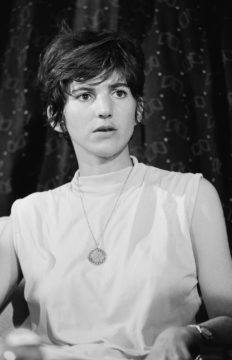George Packer in The Atlantic:
 In 1966, a young American journalist named Frances FitzGerald began publishing articles from South Vietnam in leading magazines, including this one. She was the unlikeliest of war correspondents—born into immense privilege, a daughter of the high-WASP ascendancy. Her father, Desmond FitzGerald, was a top CIA official; her mother, Marietta Tree, a socialite and liberal activist. FitzGerald was raised with servants and horses, and she had to fend off advances from the likes of Adlai Stevenson (her mother’s lover) and Henry Kissinger. Her family contacts got her through the door of feature journalism in New York, but as a woman, she was denied the chance to pursue the serious work she wanted to do. She escaped this jeweled trap by making her own way to Saigon at age 25, just as the American war was escalating.
In 1966, a young American journalist named Frances FitzGerald began publishing articles from South Vietnam in leading magazines, including this one. She was the unlikeliest of war correspondents—born into immense privilege, a daughter of the high-WASP ascendancy. Her father, Desmond FitzGerald, was a top CIA official; her mother, Marietta Tree, a socialite and liberal activist. FitzGerald was raised with servants and horses, and she had to fend off advances from the likes of Adlai Stevenson (her mother’s lover) and Henry Kissinger. Her family contacts got her through the door of feature journalism in New York, but as a woman, she was denied the chance to pursue the serious work she wanted to do. She escaped this jeweled trap by making her own way to Saigon at age 25, just as the American war was escalating.
The Vietnam War had already produced some of the greatest journalism of the century and made the reputations of young reporters such as David Halberstam, Neil Sheehan (who died earlier this year), and Malcolm Browne. All of them were men. All focused their reporting on the fighting, and on the lies and failures of American officialdom. FitzGerald pursued a different story. Sheltered all her life, she was profoundly shocked by the suffering of the Vietnamese—not just the death, injury, and displacement, but the loss of identity under the crushing weight of the Americans. Rather than competing with her male colleagues, she spent time in hospitals, villages, and slums, and she became engrossed in the politics of Buddhist students, the tragedies of refugees, the strategy of the Viet Cong, the history and culture of Vietnam. It took a 20-something Radcliffe graduate with an appetite for French anthropology and immersive reporting to bring home the bad news that no officials and few journalists were telling Americans: The war was hopeless because the United States, ignorant of Vietnam, had taken over the colonialist role of the French.
